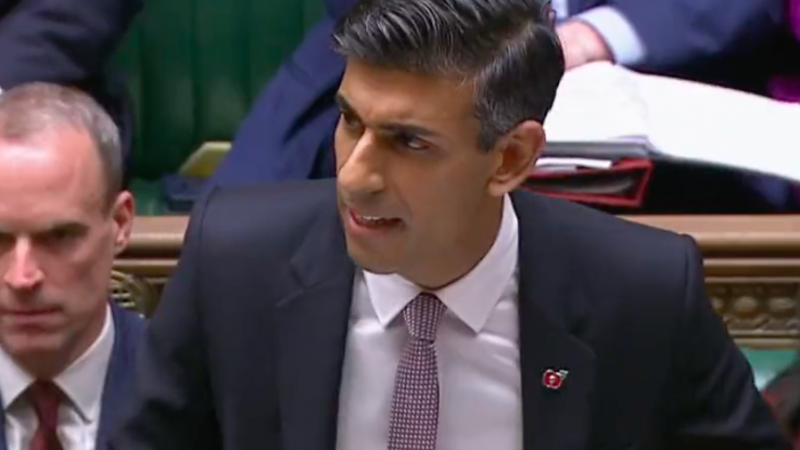'We can have either democracy and public accountability or rampant corporate power concentrated in the hands of a few business executives, but not both.'

Prem Sikka is an Emeritus Professor of Accounting at the University of Essex and the University of Sheffield, a Labour member of the House of Lords, and Contributing Editor at Left Foot Forward.
Rishi Sunak is the UK’s third Prime Minister in three months. He replaced Liz Truss after her budget was rejected by financial markets which trashed the value of the Pound. Around £1.3trn has been erased from the value of UK bonds since the start of 2022. The government is dutifully rewriting the budget to appease financial elites.
The grip of big money continues to tighten over UK politics and the country is sinking deeper into the neoliberal economic abyss which demands less public spending, deregulation, transfer of wealth from the less well-off to corporations and the rich. None of this has brought prosperity or happiness to the masses.
People periodically put a cross on a ballot paper to elect governments, but that cannot camouflage the crisis. Without the approval of corporations and the rich, political parties cannot meet manifesto pledges or people’s aspirations. The consequences for the people are dire. The welfare state has morphed into a democidal state which has little hesitation in sacrificing the lives of people to appease neoliberal gods, who always want more.
The evidence of a broken economy and democracy is all around us. Workers’ share of GDP, in the form of wages and salary, has shrunk from 65.1% of GDP in 1976 to barley 50% now. Capital has been the sole beneficiary of this decline as the state’s take, in the form of taxes, since the mid-1960s has been steady at around 32%-33% of GDP. Real wages have stagnated with typical worker’s pay worth less today than in 2007.
The wealth of the richest 250 has soared to nearly £711bn compared to £658bn the year before. In 2022, the remuneration of FTSE100 chief executives rose by an average of 23%, but real wages of workers fell by 2.6% in real terms. The £146.78 – £170.49 weekly state pension is the main or the only source of income for majority of 12.5 million retirees, and its real value continues to be eroded.
A quarter of UK adults have less than £100 in savings. Around 6.7 million households are in fuel poverty and the numbers are expected to rise to 11 million by April next year. Some 16.65 million people, out of a population of 68 million, live in poverty. Many of the 800,000 children who are living in poverty but are not eligible for free school meals are going hungry. In the last six months, food banks have handed out 1.3 million emergency food parcels, almost half-a-million of which went to children. The recipients include nurses, teachers and the police. Wages are so low that 41% of universal credit claimants are in work, and 68% of families living in poverty include at least one working adult. Faced with poverty and anxiety, some 1.54 million people need mental health support. More than 400,000 children a month are being treated for mental health problems.
With underfunding of the National Health Service (NHS), some 7.1 million people are awaiting appointment for hospital treatment compared to 2.5 million in 2010 and 4.5 million in February 2020, just before the pandemic. Some 2.5 million are unable to work regularly because of chronic illness and mental health issues, with the largest increase amongst younger people aged 25-34. Some 500,000 workers have dropped out of the labour market altogether due to poor health since the pandemic. The sick are expected to survive on Statutory Sick Pay of £99.35 per week. The average life expectancy is falling.
The naked alignment of the state with capital and moneyed interests has turned it into a killing machine. During the period 2012-2019, nearly 335,000 people died from government imposed austerity policies which eroded incomes and welfare services. Women have been disproportionately affected.
In 2016, a government funded study, codenamed Exercise Cygnus, concluded that the NHS would struggle to cope with outbreak of flu epidemic. The government did not fund the NHS properly and it was poorly equipped to fight the Covid pandemic. To date, some 211,000 people have died.
In 2021, some 117,000 people died while waiting for hospital appointments in England. With chronic lack of NHS capacity, the death-toll will rise. The British Heart Foundation estimates that due to severe ambulance delays, inaccessible care and ever-growing waiting lists some 30,000 have died prematurely from heart diseases.
According to Marie Curie Charity, in 2019 alone, 93,000 people died from poverty. This included 68,000 senior citizens and 25,000 working age adults. It estimated that every hour 10 people are dying from poverty.
Institutionalised inequalities, misery and state-sponsored deaths are incompatible with any notion of democracy and humanity. Yet the government is determined to inflict more austerity. More lives will be blighted. During the Second World War, some 70,000 civilians were killed by German air raids, but defunct economic ideologies pursued by an elected government have caused deaths of nearly ten times that. The UK state has morphed into a democidal state.
‘Who governs’ is a major question of our times. We can have either democracy and public accountability or rampant corporate power concentrated in the hands of a few business executives, but not both.
(Picture: Youtube Screengrab)
To reach hundreds of thousands of new readers we need to grow our donor base substantially.
That's why in 2024, we are seeking to generate 150 additional regular donors to support Left Foot Forward's work.
We still need another 117 people to donate to hit the target. You can help. Donate today.



